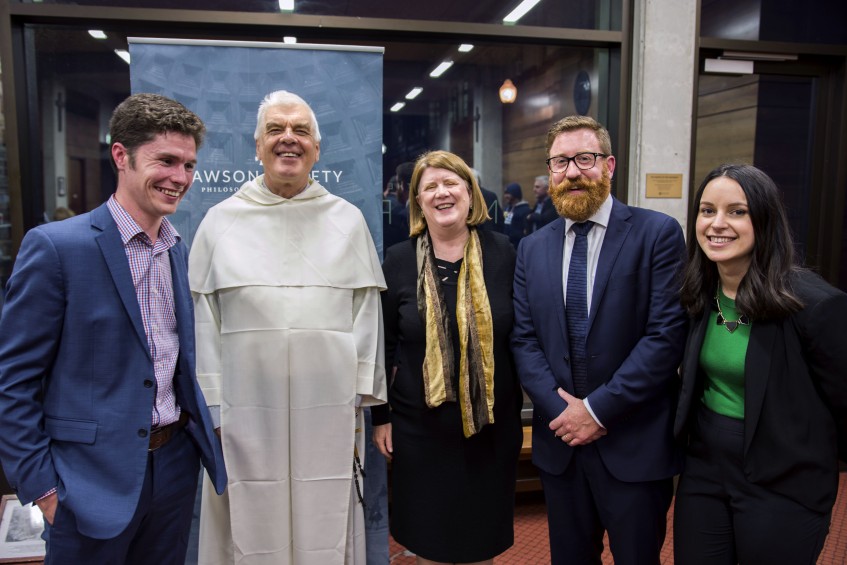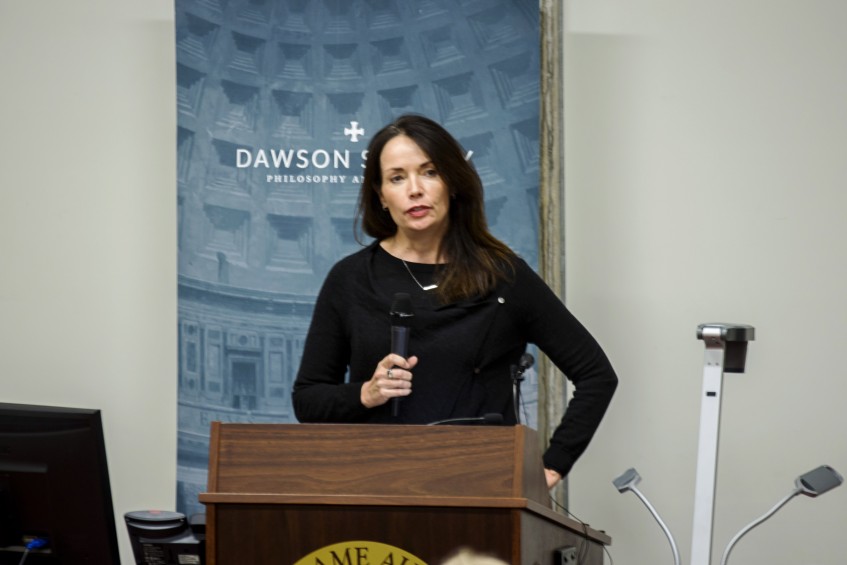Conference analyses Humanae Vitae, 50 years in hindsight

From left: Daniel Matthys, Papal Household theologian Fr Wojciech Giertych OP, UNDA Prof Tracey Rowland, Tom Gourlay, and Elizabeth Gourlay at Dawson Society’s “1968: Five Decades On” conference last week. Photo: Matthew Lau.
By Matthew Lau
A recent conference treated Perth Catholics with a unique insight into the past 50 years of the Church since Pope Paul VI’s encyclical Humanae Vitae.
More than 200 people attended the “1968: Five Decades On” three-day conference – organised by the Dawson Society – at the University of Notre Dame Australia (UNDA) Fremantle Campus last week.
In his first ever visit to Australia, Papal Household theologian Father Wojciech Giertych OP conducted a free public lecture on 12 July focusing on the applicability of Humanae Vitae in modern society.
The 1968 encyclical explains the Catholic Church teaching in relation to married love, responsible parenthood, and the exclusion of artificial contraception as a method of birth control.
The following two days involved perspicacious talks by keynote speakers including Sydney Auxiliary Bishop Richard Umbers, UNDA Professor Tracey Rowland, UWA Associate Professor John Kinder, and ABC’s Religion and Ethics Editor Scott Stephens.
All of whom presented on different facets and experiences of the cultural upheaval of 1968; from the changing nature of the Church's relationship of the world, to the civil rights movement, to the significance of Blessed Paul VI.

Professor Carole Steketee, Director of the Learning and Teaching Office at UNDA, and the Associate Head of the Fremantle campus. Photo: Matthew Lau.
Dawson Society President Tom Gourlay was left pleased with the turnout and feedback of what was “an incredible conference”.
“It was a tremendous honour to have had Fr Giertych attend and present what was an excellent paper on the ever-relevant teaching of Humanae Vitae and the tremendously life-giving teaching of the Church on marriage and the family, all set against the context of the great cultural upheavals of the 1960s,” he said.
“Of particular note was Prof Kinder's recounting of how the devastating fallout from 1968 proved a positive force in the life of Fr Luigi Giussani and the new ecclesial movement he founded – Communion and Liberation. This provided at least one model for dealing with difficult cultural times - particularly pertinent in our own day and age.”
Other shorter papers were presented during the conference addressing birth control, the civil rights movement, academic freedom in Catholic universities, and the internationalisation of terrorism among others.
“We were thrilled with both the exceptionally high quality of the papers presented and the high number of people who attended both the public lecture and the full conference,” Mr Gourlay added.
“The atmosphere of intellectual ferment and of friendship was tangible with everyone eager to continue the discussions into the break and meal times.”
It would be difficult to sum up the significance of the wide variety of papers presented, he said.
“Broadly, the papers all sought to engage with the cultural movements and ideas that either came to a head or were begun in the 1960s, particularly in 1968. The perspective was not simply historical, but one of critical evaluation.
“To examine these phenomena in an open manner, seeking to transcend ideological accounts and examine both the positive and negative elements present within these movements,” Mr Gourlay said.
“Topics subjected to this examination included the secular revolution, the rise of popular culture, the student protests which occurred around the world, the influence of cultural Marxism and the Frankfurt School of Critical Theory, along with many others.”
While the conference was multi-disciplinary, he said, the unifying theme that came to the forefront was the competing notions of humanity that undergirded these various movements.
He said 1968 was “the high point in a crisis of what it means to be a human person”.
“In light of that, the Church's response, captured in paragraph 22 of the Vatican II document Gaudium et Spes, came to be understood as the only adequate answer: "The truth is that only in the mystery of the incarnate Word does the mystery of man take on light... Christ, the final Adam, by the revelation of the mystery of the Father and His love, fully reveals man to man himself and makes his supreme calling clear’," Mr Gourlay elaborated.
“This was understood as perhaps a guiding light for us today, in the many difficulties of our own time.”
